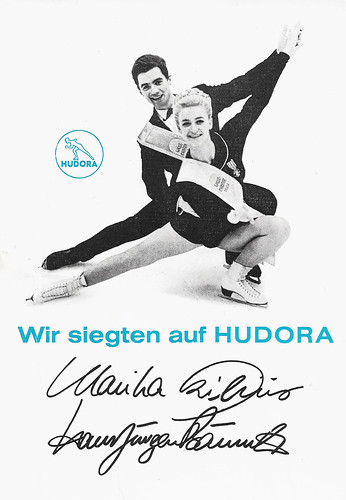German postcard by ISV, no. K 37. Photo: F. Schneider.

Czech postcard by Pressfoto, no. S 12/2, 1964. Photo: Zdenek Havelka. Kilius and Bäumler won a Silver Medal at the IX Olympic Winter Games in Innsbruck (1964).

German promotion card by Hudora-Schlittschuhen (skates). Caption: Wir siegten auf Hudora (We won on Hudora).
German postcard by ISV, no. H. 115.

German promotion card by CBS.
Stripped
Hans-Jürgen Bäumler was born in Dachau, Germany, in 1942. Bäumler started figure skating at the age of eight. His ambitious mother, Anni Bäumler, moved with her son from his native town of Dachau to Garmisch-Partenkirchen after his primary school years. He had little contact with his father, who lived in Dachau, as he grew up. He joined SC Riessersee in Garmisch-Partenkirchen and was coached by Erich Zeller from the early 1950s. In 1954, Bäumler won his first national title as German junior champion, and a year later, at the age of 13, he beat the slightly younger Manfred Schnelldorfer in the Bavarian championships.
From 1956 to 1959, Bäumler managed to secure a podium place in men's solo figure skating at the German championships. At the time, he was the third-best German figure skater, behind Manfred Schnelldorfer and Tilo Gutzeit. He participated in the European championships from 1956 to 1958. His best result was sixth place. In addition, he skated solo in two world championships. In 1956, he scored 12th place and in 1958, 14th place.
He became famous in the pairs event with his skating partner Marika Kilius. In 1957 the two teamed up. With her, he became the German pair riding champion in 1958, 1959, 1963 and 1964. From 1959 to 1964, they became European champions six consecutive times. They won their first silver world championship medal in Colorado Springs (1959), behind Canadian pair Barbara Wagner and Robert Paul. In 1960, they won the bronze medal in Vancouver. In 1963, Kilius and Bäumler became world champions in Cortina d'Ampezzo and in 1964 in Dortmund. As a pair, they contested two Winter Olympics. In both Squaw Valley (1960) and Innsbruck (1964), they won the silver medal.
In 1964 they turned professional and both performed first at the Vienna Ice Revue and finally at Holiday on Ice. Both Hans-Jürgen and Marika also became singers of Schlagers (the German version of pop songs) in the mid-1960s. Their most successful duet was 'Honeymoon in St.Tropez' (1964). Bäumler's greatest solo hit was 'Wunderschönes fremdes Mädchen' (Wonderful Strange Girl) (1964).
The tabloids portrayed Kilius and Bäumler as "ice princess" and "ice prince" and accompanied their private life in detail with emotional, partly constructed headlines in the form of an "endless fairy tale". The fact that the athletes described as the "dream couple" did not become a couple in real life was met with great disappointment among their followers. In 1966 they were stripped of their silver medal which they had won at the Winter Olympics in 1964, while allegedly they had signed this contract prior to the 1964 Winter Olympics. They were rehabilitated in 1987 by the International Skating Union (ISU), the original result stood and they got their silver medals back.
Dutch postcard by Uitg. en druk. 't Sticht, Utrecht, no. 6120.
Dutch postcard by 't Sticht, Utrecht, no. AX 6091. Photo: Gofilex. Publicity still for Die grosse Kür/The Great Free Program (Franz Antel, 1964).
German postcard by Filmbilder-Vertrieb Ernst Freithoff, Essen, no. 878. Retail price: 10 Pfg.
German postcard by CBS.

German postcard by Filmbilder-Vertrieb Ernst Freihoff, Essen, no. AX 6160.
Ice Operetta
From 1964 on, Hans-Jürgen Bäumler also worked as a film actor. His debut was the ice musical Die Große Kür/The Great Free Program (Franz Antel, 1964) with Marika Kilius.
In the 1960s he performed in a series of dramas and comedies like Ruf der Wälder/Call of the forests (Franz Antel, 1965) with Terence Hill, Die Liebesquelle/The love source (Ernst Hofbauer, 1965) and Das Sündige Dorf/The sinful village (Werner Jacobs, 1966).
Apart from these forgettable light entertainment films, he was seen on stage in the ice spectacle 'Eisoperette' (Ice Operetta) and in operettas like 'Im weißen Rössel' (The White Horse Inn) (1969) and 'Maske in Blau' (Mask in Blue) (1970).
He was also successful in the popular TV series Salto Mortale (1969-1972). In the mid-1970s he hosted several quiz shows on German television and between 1990 and 1993 he presented the TV show Riskant/Risky.
In the last decades, Hans-Jürgen Bäumler mainly worked as a theatre actor and appears on television in series like Kreuzfahrt ins Glück/Cruise into Happiness (2008), Unser Charly/Our Charly (2000-2012) and Dr. Klein (2019). In 2011, he was inducted into the German sport's Hall of Fame. With his wife Marina, he has two sons Christoph and Bastian. He and his wife live in Nice, in the south of France.
German signature card.
German signature card.
German signature card by ZDF. Photo: Kay Engels.
Sources: Wikipedia (English, German and Dutch) and IMDb.
This post was last updated on 5 May 2023.
No comments:
Post a Comment